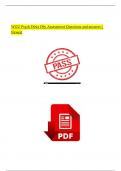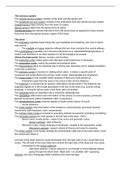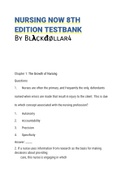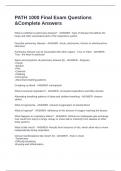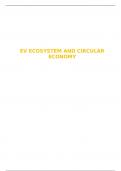Unit 9: IT Project Management
Assignment Title – An Investigation
Learning Aims A: Investigate the principles and methodologies of IT
project management as used in the industry
Date Issued: 20th November 2023
Final Deadline: 8th December 2023
,Introduction
I was recently recruited by a new software development company as a trainee project
manager. The company is setting up the procedures it will use before taking on any
development projects. My manager has asked me to investigate the different project
management methodologies that the company could use and give a knowledgeable report
back to her. I will be explaining and evaluating the different projects that have been
successfully used by project management methodologies like PRINCE2, RAD, Waterfall and
agile. Give a comprehensive range of benefits and limitations of using a methodology based
on the context of the project.
What is Project Management?
A typical IT project will include different aspects related to the management of the project,
these are software application development, installing IT systems and information collection
with analysis. Understanding that a project has a defined beginning, end point of time and
authentic scope of work completed for the given subject or benefit. Project management is
the art of planning, organising and controlling the project activities so the project is
successfully completed within the time, budget and quality constraints and which problems
are resolved with risks and issues mitigated. There are five main stages that every project
must follow and implement into the project structure to maximize success. These stages are
project initiation, project planning, project execution, project monitoring and controlling
and lastly project closing.
P1 – Explain
There are five main stages to manage a project these are:
Project Initiation
This is the first stage of a project that outlines the main focus of what the project is intended
to do. For this stage, developing an overall business strategy and producing knowledge on a
broader level by understanding the key aspects of meeting the needs of a project as well as
creating a project charter to identify the timeline and how each aspect of a project forms.
The project charter consists of project limitations to show what is expected to go wrong
during the project, broad goals, a budget to show how much money is being spent, an
, expected timeline from start to finish. Furthermore, the project must show the justification
and requirements that are needed to meet end goals.
Project Planning
The project planning phase gives details about how the project will be controlled and
monitored by outlining the project's roadmap. This phase of project management is
expected to take much more time and effort because of meeting technical requirements,
creating a communication plan, developing a project schedule and constructing goals. Many
companies use several methods to grow the project goals but the main two are S.M.A.R.T
goals and C.L.E.A.R goals. SMART goals show the reliability and specificity of each aspect of
the project lifecycle to minimize risk and allow project managers to make clear and
achievable goals. Whereas CLEAR goals give flexibility and collaboration to cater to the
effective nature of the workplace within a company. During the planning stage, the project
manager will face potential project management risks, project delays and scope creep which
cause huge problems for a project team.
Project Executing
Project execution is where the real work takes place by the team. The project manager plays
a huge role into this stage as it is his job to establish efficient workflows and monitor
progress from the team. Additionally, a project manager must maintain effective
communication and collaboration between stakeholders to ensure the project runs
smoothly and everyone is updated on upcoming details that may or may not arise. An
example of a collaboration tool is Microsoft teams or Zoom which is highly popular for
meetings and communication with the team. This will improve productivity and efficiency as
well as make life easier for the project team.
Project Monitoring and Controlling
This stage of the project outlines the control and observation in accordance with the
planning and initiation tasks that need to be met. For example, these ensure the objectives
and project deliverables are met as well as the manager holding responsibility for
quantitatively tracking the cost being made and how much effort is being spent during the
process of project management. Furthermore, tracking and monitoring to ensure deadlines
are met and budgets are calculated which is highly important for future projects.
Project Closing
Final stage of the project management process, project closure. This stage indicates the final
conclusion, goal and business strategy after the final delivery. During the project execution
stage, this is where the project manager or stakeholders hire external talent to specifically
put the project on contract. By completing the necessary paperwork and terminating
contracts this will ensure the project is secure and finalised as it is the project manager's
duty. As a result, most teams will hold a reflection meeting discussing the failures and
successes that happened within the project. Moreover, this is an effective way to
continuously improve each aspect of a project and overall improve productivity for the team
for future projects.

